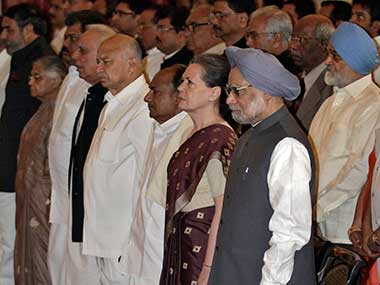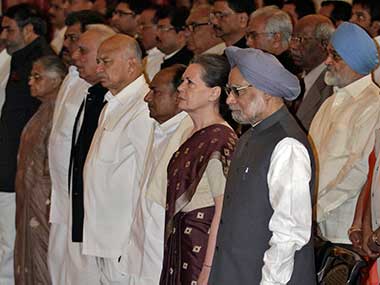Just as the flapping of a butterfly in an Amazon jungle can set off hurricanes in far-off places, a vote at the United Nations Human Rights Commission in far-off Geneva on Sri Lanka’s failure to investigate human rights abuses in the final phases of its war against the LTTE has pushed the UPA government to the brink of collapse. The withdrawal of the DMK, the Congress’ erstwhile alliance partner in Tamil Nadu, leaves the UPA hobbling. All hopes of a face-saving formulation - in the form of a parliamentary resolution that assuages the DMK - were dashed at the all-party meeting late on Wednesday, when the BJP and the Left parties resolutely opposed any such move on the grounds that it seemed intended solely to facilitate the survival of the UPA government, which they were not obliged to support. But with its survival instincts honed over time , the Congress has reflexively turned to the Samajwadi Party and the Bahujan Samaj Party for succour. The dynamics of the many moving parts that make up the Indian polity also found curious expression when the Trinamool Congress - which had walked out of the UPA last year - indicated that it would back the Centre in finding some sort of via media on the Sri Lankan issue. And, yet, late at night, reports indicated that the Trinamool Congress would bring forward a no-confidence motion in the Lok Sabha, perhaps as early as on Thursday. [caption id=“attachment_662418” align=“alignright” width=“380”]  The UPA government may be enfeebled, but it will live to fight another day. Reuters[/caption] Meanwhile, the Samajwadi Party, which was miffed by Beni Prasad Verma’s comments about Mulayam Singh Yadav’s terrorist connections, has indicated that it will decide on Thursday whether or not it would support the UPA. The news that Mulayam Singh Yadav met NCP leader and UPA constituent Sharad Pawar on Wednesday also gave room for speculation on what the two wily politicians are up to. Somewhat uncharacteristically for someone who courts the Muslim vote so assiduously, Mulayam Singh also gave voice to the unmentionable by actually saying that the NDA under Prime Minister AB Vajpayee performed far better than the UPA. This is the same Mulayam Singh, for instance, who said last year that he would support the UPA (which was then facing grave charges of corruption) simply to keep out the “communal BJP” from capitalising on the political vacuum. It just shows that given the state of flux today, he wishes to keep all options open, although his first instinct is to work towards a Third Front that has thus far proved elusive. Curiously, even after pulling out of the UPA, DMK leader M Karunanidhi suggested that it was not his intention to see the UPA government fall. The BJP, meanwhile, has said that it would not move a no-confidence motion against the UPA government because it would prefer to see the rickety coalition come down “brick by brick”. Its spokesman Ravi Shankar Prasad, however, dodged questions about his party’s stand on a Trinamool Congress-sponsored no-confidence motion (if it comes through). What will all these competing political dynamics play out? First, it seems clear that no party - not the Congress, not the BJP, not even the DMK or the Samajwadi Party or the BSP - wants immediate elections. For all the bravado surrounding Congress president Sonia Gandhi’s claim that her party would enthusiastically fight an election if one was foisted on the country - and Rahul Gandhi’s bugle call to partymen to prepare for elections - the Congress is aware that it still has weapons to play in the slice-and-dice game that passes for politics in India. Enticements are already being blandished for the promise of support for the UPA, and simultaneously , the big bazookas - in the form of investigating agencies that operate at the call of the Congress - are being pulled out. Given the malleability of political loyalties, particularly around the centre of Indian politics, the UPA has more options for sheer survival than its detractors would like to admit. And since much of its political calculation rests on staying in power - by hook or by crook - in order to push through with a slew of legislative initiatives that it hopes to place as the centrepiece of its campaign theme - including, critically, the Food Security Bill - it will almost certainly hobble along. India will almost certainly vote along with the US and against Sri Lanka in Geneva today, having perhaps watered down the resolution enough to ease its qualms about stepping on Colombo’s toes. Just as surely, it appears, the UPA government will stumble along, even if a no-confidence vote is brought forward against in Parliament today. The momentum for early elections is singularly lacking among all political formations, and the UPA will almost certainly be beneficiary of that inertia. The Karnataka election in May is sure to uplift Congress sentiments, but in the successive round of Assembly elections it faces a virtual drubbing. Political analysts reckon that the Congress may be tempted to opt for simultaneous parliamentary election, perhaps in November, in the hope of muddying the waters enough for it to emerge ahead of the game yet again. There is much merit in that argument.
The UPA government is skating on thin ice, but it likely faces no immediate prospect of a collapse. Elections in November 2013 seem more likely now.
Advertisement
End of Article


)
)
)
)
)
)
)
)
)



